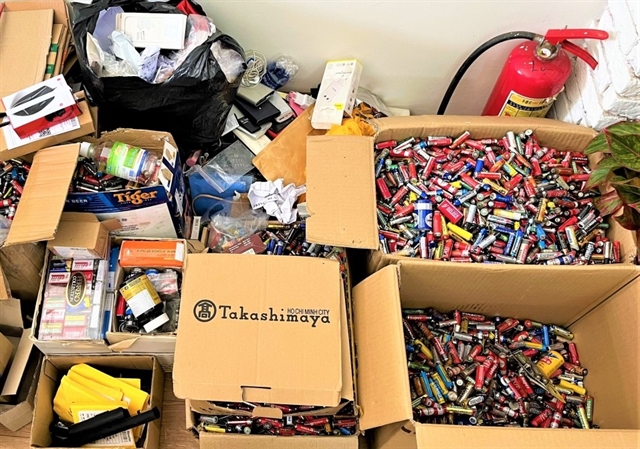Swapping batteries for plants, cleaning waste at markets or refilling cosmetics are just some of the examples of young people engaging in environmental protection in HCM City.

Batteries collected by the "Swapping batteries for plants" project. — Photo VOV
Today many young people use straws made from rice, bamboo, grass or glass instead of plastic straws; reduce plastic bags by bringing tote bags when shopping; or use personal water bottles to buy coffee, milk, and tea to limit the use of plastic cups. The list goes on.
These actions are not only a temporary movement but have become a green lifestyle adopted and maintained by young people for many years.
Immersed in buildings with green lifestyle, Refill Station was born – a chain of stores providing products for personal and family use made from environmentally friendly materials such as bamboo brushes, bamboo straws, wooden combs, loofah bath sponges, cloth masks, rice soap and more.
At Refill Station, there is an exceptional service that allows and encourages buyers to bring old bottles and containers to refill shampoo, shower gel, dishwashers and detergent to reduce plastic waste.
In operation since 2018, Nguyen Da Quyen – one of the two founders of Refill Station, said that plastic is non-biodegradable and lasts for hundreds of years, and she wants to reduce plastic waste.
"There are a lot of people doing it abroad, and I can do it too, so I created this project," Quyen said.
Another activity spreading a green lifestyle carried out by many young people in HCM City is "swapping batteries for plants" to raise awareness about the harmful effects of discharging old batteries into the environment.
A group called "House of many leaves" founded by Green Life HCMC Club, is one of the groups implementing the swapping programme. Many young people have enthusiastically responded by collecting old batteries from their families, schools and workplaces to bring to the programme.
Hoang Quy Binh, founder of "House of many leaves," said that the group had collected 50,000 batteries, and more than 2,000 people participated after only two days of organising.
After reading about the event via Facebook, My Hoa and her daughter came to swap their batteries. According to Hoa, the project is very good because many people still do not understand the toxicity of batteries when people put them in the trash.
So the first thing that seems small but isn't is to make people aware. Then, with this plant swapping activity, everyone, from children to adults, becomes more aware every day of how batteries should be disposed of.
Another activity is the "Garbage-free market" at Thanh Da residence, Binh Thanh District. The products for sale are mainly green, used products or handicrafts.
Dang Quang Minh Tuan, a first-year student at the University of Food Industry and the founder of the market, said that the market's focus was not to sell items that create waste, including any plastic.
Tuan is concerned with how to get more and more young people to join in and protect the environment.
"I feel that the current environmental problems are quite painful. I also feel a bit sad because few people of my age have the awareness to protect the environment. That's why we're here with a mission to spread awareness of the protection of the environment," he said.
With profound environmental awareness and very specific practical actions, young people in HCM City are building and spreading a green lifestyle throughout the community.